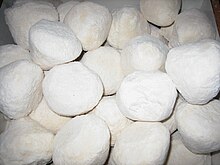Jameed
This article needs additional citations for verification. (October 2007) |
 White Jameed in a shop front | |
| Place of origin | Jordanian cuisine |
|---|---|
| Main ingredients | laban |
Jameed (Arabic: جميد, literally "hardened") is a Jordanian food consisting of hard dry laban made from ewe or goat's milk.[1] Milk is kept in a fine woven cheesecloth to make a thick yogurt. Salt is added daily to thicken the yogurt even more and the outside of the yogurt-filled cheesecloth is rinsed with water to allow any remaining whey to seep through. After a few days of salting the yogurt, it becomes very dense and it can be removed from the cheesecloth and shaped into round balls. It is then set to dry for a few days. If it is dried in the sun it becomes yellow; if it is dried in the shade it remains white. It is important that the jameed is dry to the core because any dampness can spoil the preservation process. It is also often referred to as "rock cheese".
Origin
Traditionally, Bedouins supplied Jordanian markets with jameed and other sheep and goat dairy products.[1][2] Jameed is used in Jordanian dishes such as fatta, mahashi and mansaf,[1] the latter also being the national dish of Jordan.[2] Karak, Jordan is famous for its high-quality jameed.[2] It is used in other Jordanian dishes such as Kousa Mahshi, Kubbeh blabaniyyeh, Mjalaleh, Rashouf, Madgoga and er-Rgage.[3]
See also
References
- ^ a b c Albala, Ken (2011-05-25). Food Cultures of the World Encyclopedia [4 volumes]: [Four Volumes]. ABC-CLIO. ISBN 9780313376276.
- ^ a b c http://mimicooks.com/2009/03/jordanian-mansaf.html
- ^ "ارتفاع الأسعار يفتح قاموس الأكلات الشعبية في الكرك". وكالة عمون الاخبارية (Ammon News Agency) (in Arabic). Retrieved 2016-03-26.
